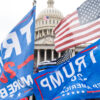In a significant win for religious liberty, a federal court last month ruled that a state university in Iowa can’t require a Christian student organization to have non-Christian leaders.
The court ruled that the university had discriminated against the Christian group and that top university officers, including the vice president, must pay out of their own pockets to cover the group’s legal fees.
The dispute began when the University of Iowa kicked the Christian group InterVarsity off campus for requiring its leaders to be Christians.
A dozen other religious groups were also kicked off campus for the same reason—including Sikhs, Muslims, and Latter-day Saints. Each group required its leaders to share their group’s faith.
In InterVarsity v. University of Iowa, the court ruled that the university and its officers had violated the First Amendment. The court even left open the possibility that the university’s president, Bruce Harreld, could also be found liable.
InterVarsity has been on campus at the University of Iowa for over 25 years. Like many student groups, it welcomes all students as members, but requires those who lead its ministry to affirm its statement of faith.
For years, this had created no issues. But in June 2018, the university determined that InterVarsity was in violation of its nondiscrimination policy for requiring its leaders to be Christian.
The university imposed a number of consequences for this so-called discrimination: It limited InterVarsity’s access to campus, shut down its campus website, and labeled the group “defunct.”
As a result, the group suffered its sharpest membership drop on campus in over 20 years.
During oral arguments, the judge told the attorney representing the University of Iowa it is “ludicrous” and “incredibly baffling” that the school would “selectively go after student groups based on what they think.”
The judge continued, “The University of Iowa may not selectively go after student groups based on what they think, based on what they advocate, whether it’s religious or otherwise, unless you’re going to do it evenly, equally. That means you cannot carve out a particular type of group and put them on hold for their own good.”
The court stated it did “not know how a reasonable person could have concluded this was acceptable,” since it “plainly” doubled down on the exact same conduct the court had already held to be unlawful in a similar case, Business Leaders in Christ v. University of Iowa.
The school’s treatment of faith groups was selective. Secular groups and a few religious ones had no problem organizing and functioning however they chose, requiring that their leaders hold to certain views.
By singling out these religious groups, the court determined the university was in fact the one guilty of discrimination.
The court’s set things right. The university will now have to respect InterVarsity’s right to select its leaders the way it wants to.
“We must have leaders who share our faith,” Greg Jao, director of external relations at InterVarsity Christian Fellowship/USA, said in a statement.
“No group—religious or secular—could survive with leaders who reject its values. We’re grateful the court has stopped the university’s religious discrimination, and we look forward to continuing our ministry on campus for years to come.”
Though it is disappointing to observe such blatant anti-religious discrimination from a major university, it’s refreshing to see a federal court come to the aid of those who were wronged, and recognize religious freedom with such clarity and zeal.




























